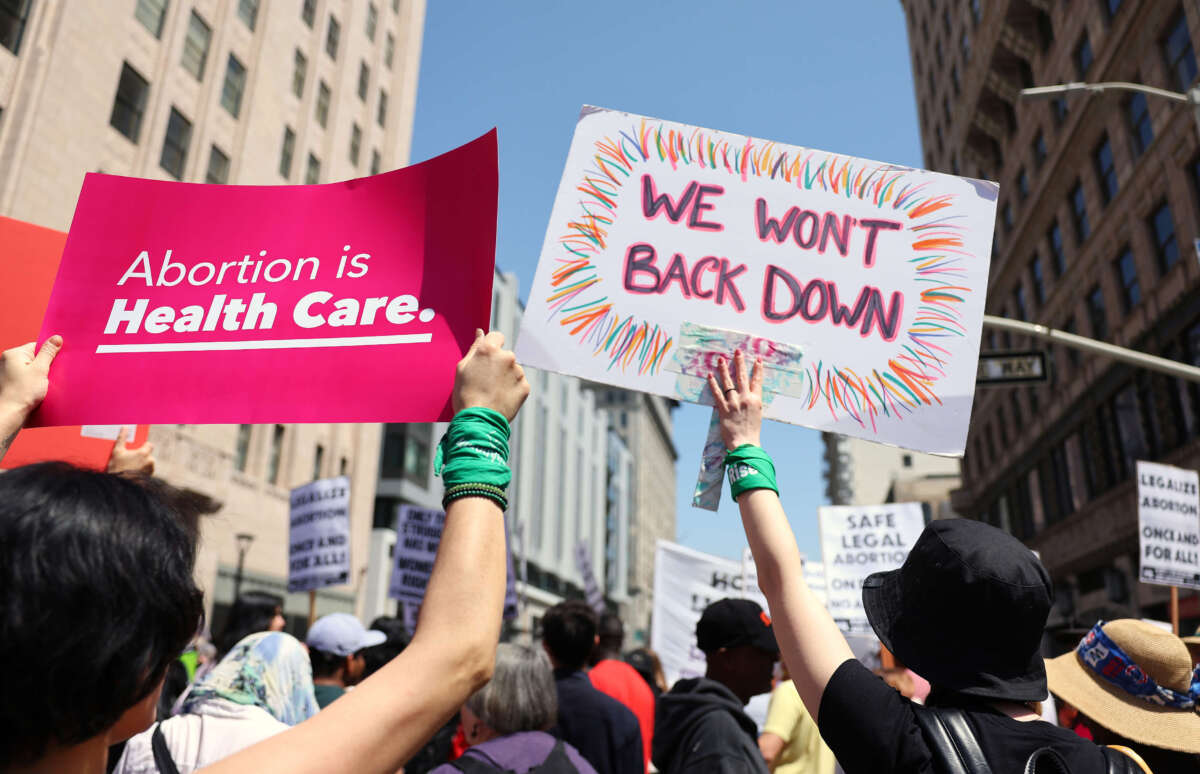Truthout is a vital news source and a living history of political struggle. If you think our work is valuable, support us with a donation of any size.
Abortion rights defenders in Arkansas said Thursday it was “a dark day” after the state’s Supreme Court ruled a ballot measure that would enshrine stronger reproductive rights protections for people in the state was ineligible for November election ballots.
The court ruled 4-3 in favor of arguments presented by Republican officials including Secretary of State John Thurston and Attorney General Tim Griffin, who said organizers with Arkansans for Limited Government (AFLG) — which submitted more than 101,000 signatures to secure the amendment for the ballot — had failed to correctly submit paperwork verifying that paid canvassers had been properly trained.
AFLG strategy director Rebecca Bobrow expressed agreement with Justice Karen Baker’s dissent, which accused Thurston of making up statutory requirements “out of whole cloth” and of being “determined to keep this particular vote from the people” at all costs.
AFLG proposed an amendment that would have allowed people in Arkansas to obtain abortion care up to 18 weeks after fertilization, with additional exceptions for incest, rape, and fetal anomalies that would make it impossible for a fetus to survive after birth. Arkansas currently has one of the strictest abortion bans in the U.S., with abortion care allowed only in medical emergencies.
When Thurston rejected the group’s petition last month, saying it had failed to submit an official statement regarding the training of its paid canvassers, AFLG sued to force the state to count all the signatures, which surpassed the 90,704 that were needed for the ballot initiative to be approved.
About 14,000 of the group’s signatures were collected by paid canvassers, so the number of signatures gathered by unpaid volunteers — 87,675 — fell below the threshold.
As the Arkansas Times reported, the secretary of state’s handbook on petitions states that an affidavit certifying that canvassers received training is a requirement for submitting petitions — but the three dissenting justices on Thursday wrote “that the actual statutory language appears to show that the paperwork oversight should not be fatal to the group’s effort. And the handbook cannot overrule the law.”
“Despite collecting signatures from more than 100,000 Arkansans — and despite the fact that the plain language of the statutes appeared to show that the review process for the petition should have continued — the court ruled that paperwork omission was fatal to the group’s effort,” wrote David Ramsey and Matt Campbell at the Arkansas Times. “For those following the case, this has always been the fear: Even if the law was on their side, the majority of the court opposes abortion. Ultimately the law is what the Supreme Court says it is. Among the grab-bag of flimsy arguments offered by Attorney General Tim Griffin, they found a couple they could stretch to suit the purpose of disqualifying the abortion petition.”
Baker wrote in her dissent that “the majority has succeeded in its efforts to change the law in order to deprive the voters of the opportunity to vote on this issue, which is not the proper role of this court.”
Compared to other ballot initiatives, she added, Thurston and the court’s right-wing majority treated the abortion right amendment “differently for the sole purpose of preventing the people from voting on this issue.”
Ramsey and Campbell wrote that AFLG could theoretically file a lawsuit in federal court challenging the ruling.
“But for procedural and timing reasons, that is extremely unlikely to help,” they wrote. “In all likelihood, it’s over: Citizens will not have the opportunity to vote to restore abortion rights in November.”
Arkansas state Sen. Greg Leding (D-30) called the ruling “maddening and heartbreaking” and urged voters to consider abortion rights when they cast their ballots in November, regardless of whether the amendment is on ballots.
It’s maddening and heartbreaking that the Arkansas Abortion Amendment won’t be on the ballot this fall, but that doesn’t mean Arkansans don’t get to vote on the issue.
— Greg Leding (@GregLeding) August 22, 2024
Ask your legislative candidates for their stance. Ask if they support our total ban.
And vote accordingly.
Bobrow told supporters that AFLG’s fight “isn’t over” despite the “infuriating” decision.
“We can’t — and won’t — rest until Arkansas women have access to safe, standard healthcare and the autonomy to make decisions about their bodies free from governmental interference,” said Bobrow. “This effort has generated a wave of fiercely engaged Arkansas women. We are outraged. We will not back down. And we will remember this in November.”
Press freedom is under attack
As Trump cracks down on political speech, independent media is increasingly necessary.
Truthout produces reporting you won’t see in the mainstream: journalism from the frontlines of global conflict, interviews with grassroots movement leaders, high-quality legal analysis and more.
Our work is possible thanks to reader support. Help Truthout catalyze change and social justice — make a tax-deductible monthly or one-time donation today.
